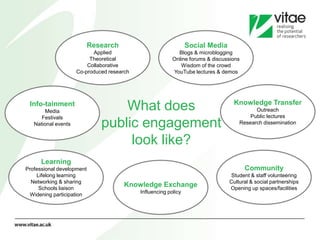The engaging researcher introduction 12-07-2012
- 1. The University of Manchester The engaging researcher
- 2. Today‟s session Getting started with public engagement Introducing public engagement Your motivations Who are „the public‟? Engaging others with your research Designing a public engagement activity Further sources of support
- 4. Research Social Media Applied Blogs & microblogging Theoretical Online forums & discussions Collaborative Wisdom of the crowd Co-produced research YouTube lectures & demos Knowledge Transfer Info-tainment Media What does Outreach Festivals Public lectures National events public engagement Research dissemination look like? Learning Professional development Community Lifelong learning Student & staff volunteering Networking & sharing Cultural & social partnerships Schools liaison Knowledge Exchange Opening up spaces/facilities Influencing policy Widening participation
- 5. The Onion Wellcome Trust
- 7. Why engage the public with my research? “The question should not be is our research any good, but what is it good for?” Professor Chris Brink, VC, Newcastle University “Don't assume because you find all your work fascinating that the public will - look for your common ground.” Courtesy of alexanderdrachmann (Flickr ID) Dr Alexis Kirke, University of Plymouth
- 8. Courtesy of mararie (Flickr ID)
- 9. Courtesy of Bekathwia (Flickr ID)
- 10. Designing an activity What could you do to engage your public with your research? What is the purpose of your engagement activity? Why would it engage your public? What research are you engaging them with? How do you know your activity will work?
- 11. What next? Courtesy of JMC Photos (Flickr ID)
- 12. Further support www.slideshare.net/vitaenwhub www.vitae.ac.uk/publicengagement www.vitae.ac.uk/peblog www.vitae.ac.uk/researcherbooklets www.manchesterbeacon.org www.publicengagement.ac.uk www.rcuk.ac.uk/per
- 13. Courtesy of jayneandd (Flickr ID)
Editor's Notes
- Housekeeping and our introduction
- What is public engagement for them. Get them to shout out.
- Public engagement means many things to many people. There isn’t a single definition and depending on your research discipline and your Institution’s culture your experiences of ‘what it is’ and ‘doing it’ will differ greatly. But it is useful come to a shared understanding of what we mean by public engagement. Public engagement describes the myriad of ways in which the activity and benefits of research can be shared with the public. Engagement is by definition a two-way process, involving interactions and listening, with the goal of generating mutual benefit. – Vitae “The engaging researcher” booklet. There are a large number of opportunities to engage with the general public, for example:giving talks at local and national organisations about your arearunning or contributing to adult education coursescontributing to open days and other school outreach activitiestaking part in writing or poster competitionsjoining a scheme like Science Ambassadors or Researchers in Residence to go into schoolswriting a press release or blog about your researchYou can find out more about specific public engagement activities by taking a look at the following:Vitae engaging researcher guide, public engagement blog, and opportunities and resource list – http://www.vitae.ac.uk/publicengagementNCCPE website, toolkits, and case studies – http://www.publicengagement.ac.uk/Your University website, there may be a public engagement unit or outreach office that coordinates activities or provides support.Talking to other researchers.Participant Reflection Questions:How familiar are you with each of these public engagement activities? What you like to know more about or get involved in?Where will you go or who will you talk to find out more?
- One early career researcher’s experience of getting started with public engagement
- Who are ‘the public’? Explore scenarios, get them to think about one key thing to keep in mind when engaging with the public they have been given.
- What about your research might be interesting to the public? Get them to enthuse each other about their research, what are the ‘sexy headlines’, what could pull people in?
- Loads of opportunities out there, what could you do for the public we have given you and your research? Feedback main points to plenary
- Where next? Just a brief introduction to public engagement. What first step do you need to take to become an engaging researcher?
- Highlight resources












